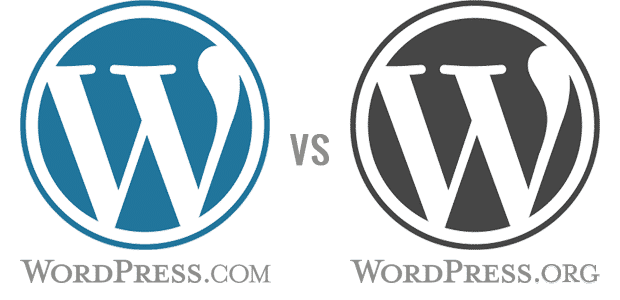If you’re new in the blogging world, you’ve already heard about Blogger, Wix, WordPress, Tumblr, Blogger, etc. and start your blogging journey with one of them because you don’t have any big budget and it allows creation of a free blog on the desired niche.
You can go for any blogging platform where you can create a free blog easily but remember it also comes with several limitations.
But if you’ve decided and choose WordPress then your job is 50% almost done because You’ve chosen the best content publishing platform on Earth.
Launched in 2003, WordPress has emerged as one of the top leading CMS, used in over 22% of the top 10 million websites on the Internet.
WordPress is best for starting a blog, a business website or a landing page for collecting leads for your products or services.
It is the most affordable website CMS Platform which comes which extensive features and gives you full control over your website.
WordPress.com vs. WordPress.com?
We shouldn’t think in terms of “WordPress.com vs WordPress.org”. People are often confused about the differences between WordPress and WordPress.com.
That’s why the title of this blogpost has the wrong meaning. Instead, the correct comparison would be WordPress.com vs a Self-Hosted WordPress site.
Why? Primarily, because WordPress.com is a managed host. And WordPress.org is NOT a host, it’s an online open-source software resource hub for self-hosted websites based on WordPress.
WordPress (sometimes known as “WordPress.org” or “self-hosted WordPress” for disambiguation purposes), is software that you can download and install on any web host for building websites.
Meanwhile WordPress.com is a hosted blogging service run by a company called Automattic and which is spearheaded by WordPress co-founder Matt Mullenweg. It’s a service that hosts WordPress blogs. It is 100% free and that comes with some limitations.
For example, users cannot install plugins on their WordPress.com website for free or use customized themes on WordPress.com for free plans (these features are available for business plans). Moreover, you Also, you cannot use any kind of ad platform such as Google AdSense on your free WordPress.com site, preventing you from monetizing it.
Additionally, you may have noticed that some WordPress-powered websites either have no credit at all or indicate that they are “Proudly powered by WordPress” at the bottom of the page. It is a solid indication that it is a self-hosted WordPress installation when there is no mention of “WordPress.com”. That’s how you can identify the difference between WordPress.com and WordPress self-host websites easily.
In this blog, here are the following factors on which we can compare both WordPress.com and WordPress.org
Web Hosting:
WordPress.com is ideal for newbie hobby bloggers and is free for up to 1GB of storage space; but you need to upgrade to a paid plan for more storage space with the additional features as follows:
- Personal plan: $48 /year for 6GB.
- Premium plan: $96/year for 13GB storage.
- Business plan: $300/year for 200 GB storage.
- eCommerce Plan: $540/year for 200 GB storage.
- VIP Plan (For Big Enterprises) – Starting at $25000/Yearly.
Users don’t need to worry about the latest updates or data backups as WordPress.com takes care of it automatically.
Meanwhile WordPress.org, so called ‘self-hosted’ platform, will give you just the WordPress software for installation. You have to choose and buy a domain name and web hosting server on your own and set up your blog and manage everything else on your own. Of course, most web hosting companies provide you with a one clicks installation solution for WordPress – overall, that’s easy too.
Most of shared web hosting providers in the market offer shared hosting for just $3 on a monthly basis with unlimited storage space and bandwidth.
Domain names
WordPress.com free plan comes with a custom subdomain, which seems like as yoursitename.wordpress.com
but for advanced features, you must use a paid plan. You must pay for a domain name if you want full customization (yoursitename.com). These start at $7 per month and go up to $59 per month.
When you’re on WordPress.com, each site, i.e. Each domain will cost you approximately $15 annually. But you cannot create additional sub-domains or have multiple WordPress installations.
If you’re building a website for your company or organization on WordPress then you need a proper domain name.
With WordPress.org, most web hosting companies provide a custom domain name free of cost for the 1st year if you’re a new customer.
Most of the company or organization blogs use (a) www.companyname.com/blog while some may use (b) blog.companyname.com. Either of these cases can be fulfilled by WordPress.com with the single domain option.
But when you’re looking for more than one WordPress installation, on the same domain (using either option (a) or (b)), WordPress.org would be cheaper. Your shared hosting usually allows you to have multiple MySQL databases which is all you need to set up a discrete WordPress installation. Overall, everything is under your control.
Advertisements
Have you ever wondered how WordPress.com can afford to host millions of free blogs?
WordPress.com does this by displaying advertisements on free blogs where they earn revenue to pay for the free blogs. The amount is restricted – it’s not an ad-bait. You don’t have any control over displaying ads.
For WordPress.com users, you can sign up to Wordads which is the only one advertising optimization platform for WordPress sites, where the internet’s top ad suppliers bid against each other to deliver their ads to your site and you can display ads on your blog.
Here are the criteria to eligible for Wordads:
- It must have a WordPress.com Pro, Premium, or higher plan or a Jetpack Complete or Security plan.
- You must be the owner of the blog.
- Your blog must be set as public.
Once you fulfill all requirements mentioned above then you’re eligible and can go for signup. You can show ads on your blog and earn some revenue.
On the other hand, WordPress.org doesn’t have any advertising system.
It’s up to you to choose to keep your blog clean as a whistle or turn it into an ad-bait like an online Viagra store.
As it’s totally independent that you have total control on your site. You can sign up for various ads platforms such as Google AdSense, Mediavine or AdThrive. which is mostly popular among bloggers to earn revenue by displaying ads on your own blog or websites.
Monetization
On WordPress.com, you can monetize your blog by following ways:
- Place and earn ads revenue display ads via wordads.
- Become an affiliate marketer.
- Write sponsored blog posts.
- Ask for donations.
There are 7 different ways to monetize a WordPress.org site and earn good revenue.
- Place display ads.
- Become an affiliate marketer.
- Write sponsored blog posts.
- Sell exclusive content. (For example: courses)
- Sell merchandise.
- Offer membership.
- Ask for donations.
Help & Support
WordPress.com users can access support options such as in-house email or live chat for assistance. Also, they can take advantage of support documentation and forums.
While there are different levels of support available depending on your WordPress Plans. All customers can receive free email and basic live chat support.
Ease of Use
Using WordPress.com doesn’t require coding skills but if you have some then it’s a great advantage for you. It’s actually built for non-technical people.
If you want to get your WordPress website customized, then you must have basic coding skills, otherwise you may need to hire a WordPress developer.
Customization Options
This is the biggest factor when it comes to choosing between WordPress.com and WordPress.org. Let’s have a look at customization options available for both users.
On WordPress.com you have some basic customization features like overall site color, taglines, widgets etc. You can buy additional customization packs like Custom CSS and Custom Fonts, but due to flexibility, WordPress.org is the real winner here.
Plugins
WordPress.com users can’t upload any custom, paid, or free plugins. They are restricted to utilizing the platform’s built-in plugins.
Furthermore, users can only install customized plugins depending on the Premium Plan they selected.
On the other hand, WordPress.org allows you to install any and every plugin you want.
But always be careful what you wish for, because installing too many plugins can impact internal conflicts and slow down your WordPress site.
Installing nulled or pirated plugins is like inviting all the malicious codes for a Sunday barbecue at your home. So, always use genuine plugins with their respected developers.
Themes
WordPress.com users can only use a limited number of the themes that are available in the WordPress theme library, they are not allowed to upload or customize their own themes.
Users get quick access thanks to the pre-installed themes. Depending on the premium Plan chosen by the user, only customized themes can be installed.
Meanwhile, WordPress.org offers a wide range of themes where users can search, find, and install themes. Users can also select free, custom, or commercial themes. They can customize site themes selected based on their requirements.
eCommerce Features
You cannot set up an eCommerce store with a free WordPress.com plan. For that you have to upgrade your plan it’s come to $450 yearly plan.
While WordPress.org empowers you to set up a full-fledged online store where they can sell any kind of products in bulk, accept digital payments, and drive seamless shipping.
Security and Backup
If you’re a wordpress.com site owner, then you don’t need to worry about having security and backup needs as the core WP software comes pre-installed.
The company, Automattic takes care of the site’s performance for them, which includes backup, security updates, SSL certificates, optimization, and more. Also, users will be able to access multiple pre-configured features that are built-in within the platform without requiring additional plugins.
On the other hand, WordPress.org makes it mandatory for website owners to engage in website maintenance on their own, be it for security or backup purposes. Users can install Google Analytics for free, for tracking site traffic performance. Plus, users are responsible for their own site’s performance, which includes:
- Keeping the website UpToDate.
- Keeping regular backups.
- Ensuring SPAM control options.
- Keeping the site optimized.
- Finding a host and installing the WP core software.
To ensure all these features are available, users will need to download additional plugins.
Overall, everything is up to you.
SEO Prospective
In WordPress.com doesn’t allow users to exercise great control over their website’s SEO since they cannot install any SEO plugins.
Meanwhile, WordPress.org enables users to install any kind of SEO plugins, including third-party plugins, to optimize the website’s SEO and rank better on Google’s search organic results. Also, users can make manual changes to improve their site’s SEO feature which is not available with WordPress.com.
Pros and Cons of WordPress.com and WordPress.org:
WordPress.com
Pros:
- Free hosting and domain name, with the option to upgrade to a paid plan for more features.
- Easy to use, with no technical skills required to set up a website.
- Automatic updates and security features.
- Access to a wide range of free and paid themes and plugins.
- Community support and resources available.
Cons:
- Limited customization options, especially with the free plan.
- Restricted access to the underlying code and database.
- No support for custom themes or plugins.
- Ads displayed on free plan but can’t get paid.
- Limited storage space and bandwidth on free plan.
WordPress.org:
Pros:
- Full control over the website’s code, database, and hosting environment.
- Ability to use custom themes and plugins, or create your own.
- No restrictions on monetization options or advertising.
- Access to thousands of free and paid themes and plugins.
- Can be used with any web hosting service.
Cons:
- Requires technical skills to set up and maintain the website.
- Hosting and domain name costs are not included.
- Security and updates are the responsibility of the website owner.
- May be more susceptible to security vulnerabilities if not properly maintained.
- No support available from WordPress.org, although community support is available.
FAQ’s
How to identify If a website is Built on WordPress?
Simply Add ‘Wp-Admin’ at The End of The Homepage of that URL. Once you see a screen like this appear after adding ‘/wp-admin’ to the URL of the homepage, you’ll know that it’s a WordPress website.
Is WordPress.com and WordPress.org the same?
WordPress.com is a hosting platform that provides you with a turnkey solution, while WordPress.org is a self-hosted solution (you take care of it yourself). However, the software used to run both versions is the same. WordPress.org and WordPress.com are two ways to use WordPress.
What’s the estimated cost of a WordPress.org website?
Here is the following overall estimated cost for a WordPress.org website is:
- Domain registration – $5-$10 a year
- Hosting – $30-$250 a year
- Premium Plugins – $10-$1,000 a year
- Security – $5-$250 a year
- Premium Theme – $35-$200 one-time cost
The estimated cost can be anywhere between $46-$100 a year.




